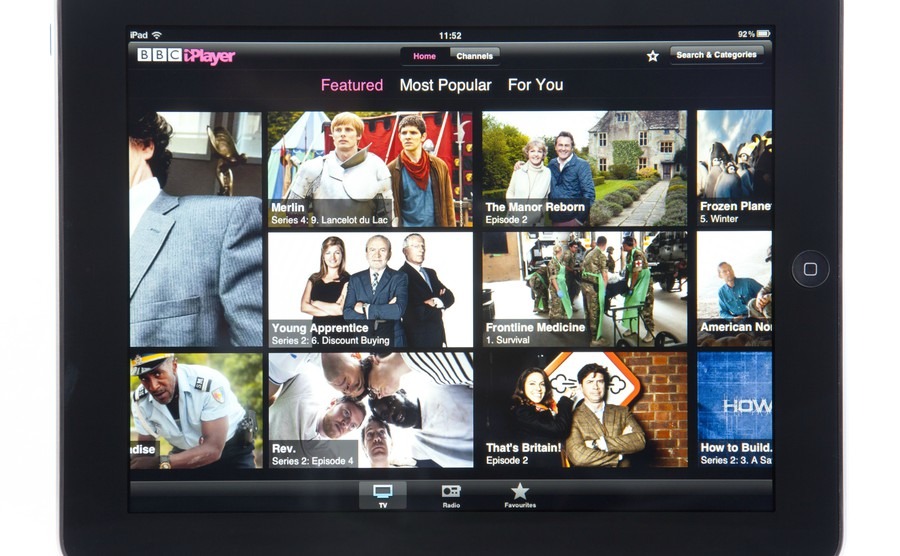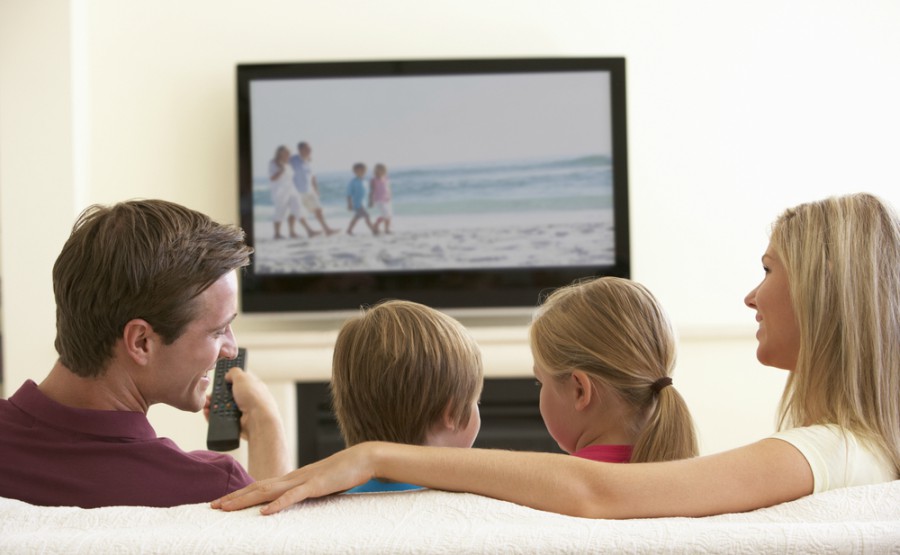You want the sunshine, but probably don’t want to miss your favourite British and US TV shows when you move abroad. Read our guide to the different ways to watch your essential TV programmes, legally and simply.
It may come as a surprise that watching British TV from abroad is such a popular topic for those who live overseas. But that “taste of home” is very alluring – whether it’s to keep up with news and sport, or simply to stay up to date with Strictly or EastEnders!
An entire industry has built up around the desire to access familiar broadcasting.
A local satellite or cable TV subscription usually provides plenty of English language content. There’s also the bonus of subtitles to provide exposure to the local language. However, many people still miss “the real thing.” There’s nothing wrong with craving those home comforts!
An entire industry has built up around this desire to access familiar broadcasting – usually meaning programs from the UK and the USA. Often the legality of devices and services that make it possible is something of a grey area. Furthermore, some solutions far more reliable than others. We discuss legality for each solution below.
Does Brexit Affect Watching British TV from Abroad?
Although Brexit changes many things for British citizens living overseas, the advice here remains valid for all third-country nationals. The rules around TV broadcasts and streaming services relate to broadcast licenses and copyright, not whether Britain is part of the EU.
Similarly, the advice here applies whether you’re moving to mainland Europe, or further afield, and is also valid for overseas residents originating in any country.

Watch TV anywhere in the world
Just before we get into the detail of all the options available to you, let’s consider how lots of people watch TV these days:
The Rise of Streaming
For many of us nowadays, watching TV doesn’t mean choosing a channel and watching what’s on. Plenty of people prefer to use streaming services like Netflix, Amazon Prime, and BBC iPlayer.
Netflix / Amazon Prime
We can get two of the big-name services out the way right from the start: Netflix is an international service that’s available in over 190 countries. If you have a Netflix account and a suitable device, you can watch the likes of The Crown or Tiger King wherever you happen to be. You will, of course, need an Internet connection! You may also notice that the exact library of content varies dependent on where you connect from.
The same applies with Amazon Prime Video, if you have a subscription. Again, you will find the exact library available is country-dependent.
For some, access to these services means there’s more than enough to watch. However, there’s WAY more content out there, and options for how to access it.
iPlayer, All4, and Other UK-Specific Services
Things get rather more complicated with certain other streaming services. For example, services like BBC iPlayer, UKTV Play and All4 are intended for UK residents. If watching British TV from abroad, for you, is about being able to use these services, you’ll generally need to consider one of the options detailed below.
It’s worth noting that this isn’t just about British TV. Other countries all have local streaming services of their own, with similar region locks and work-arounds. That’s one of the reasons why the industry for services like VPNs and SmartDNS has grown so large in recent years.
We should make clear at this point that services like iPlayer and All4 make VERY clear that they’re intended for UK residents watching them IN the UK. Accessing them from overseas is a legal grey area AT BEST.
It’s reasonable to assume that going after people watching Coronation Street in Spain probably isn’t a big law enforcement priority. However, if you want to follow the letter of the law, it’s best to build new TV viewing habits around what’s legally available to you.
Admittedly the grey area is a little greyer if you retain a UK address and have a TV licence. But we should emphasise that use of things like VPNs isn’t something we can specifically endorse.
If you travel regularly to and from your overseas home, It’s worth noting that iPlayer does permit you to DOWNLOAD some programmes WHILE you’re in the UK.
Other (Legal) Streaming Options
New services pop up all the time that open up more options. For example, BritBox, a streaming service that offers boxsets of British TV content, is now legally available in the US and Canada, as well as in the UK.
Another choice open to you is buying TV content on a “Pay As You Go” basis by purchasing seasons from Amazon, Apple or Google. If you want to stay “whiter than white” legally, you can generally find what you want wherever you happen to be, if you’re willing to pay.
Satellite options
Let’s switch to live TV, and consider the option many expats in Europe go for when watching British TV from abroad: satellite.
In 2012, and then again in 2014, expats in various European locations were dismayed when their previous solution for watching UK TV suddenly stopped working. Due to changes to the satellites delivering UK TV and Sky services, the satellite signals no longer reached as far as they did previously. This resulted in a loss of signal for many.
Prior to this, the UK satellites reached far into Europe – as far as southern Spain, Portugal’s Algarve, and right across France, Switzerland and neighbouring countries.
It’s still possible to pick up UK satellite transmissions in many places. It’s a simple matter of geography, and some overseas residents resort to huge dishes to tap in to FreeSat and Sky signals if they’re on the outer reaches of where the signals get to.
In the case of Sky, the usual method is to set up a subscription in the UK, and take the viewing card(s) and receiver(s) to the overseas home. You can either do this yourself, or use one of the many companies that offer such services in popular expat destinations.
Some expats in Spain and Portugal have also realised that they can use the British Forces network to pick up a smaller range of UK channels transmitted from a Gibraltar satellite. This network uses encryption keys which must be changed periodically. This means systems set up in this way can periodically stop working. You will likely find companies offering services that use this method.
If you are ready to invest abroad within the next few months, call our friendly Resource Team on 020 7898 0549 or email [email protected] to be put in contact with trusted lawyers, estate agents and currency specialists.
Legality
Here’s the rub: You won’t have a problem finding a company to help you with watching UK TV abroad using satellite. Plenty of firms openly advertise such services online. However, they tend to skirt over the basic legalities.
Most significant is the fact that Sky is only licensed to sell TV packages to people in the UK. Using an active Sky subscription at your expat home isn’t within the terms and conditions. When it comes to the channels broadcast over FreeSat, one could argue the situation is murkier, especially if you have a TV at home in the UK and a valid TV licence. But it’s not something you are legally supposed to be doing.
There’s no denying that plenty of expats view British TV via satellite in homes and bars. Once it’s set up it tends to continue to work reliably. However, legally speaking there are concerns. This is particularly pertinent to those with no remaining residence in the UK, and no British TV licence.

You can access BBC iPlayer using a VPN service (antb / Shutterstock.com)
IPTV boxes
Go anywhere with a significant expat population and you’ll find people selling various types of IPTV boxes. These provide access to a host of international TV broadcasts via the Internet. Many use the controversial Kodi system, which is now illegal in some places if used with add-ons that provide free access to paid content.
If you’re technically inclined, it’s also reasonably easy to find instructions for hacking devices yourself. Follow these, and you can turn something like a Roku or Amazon Fire TV box into a “fully loaded” streamer, with access to everything from sports to movie channels.
These boxes often work beautifully when they’re first installed. However, the old adage that if something seems too good to be true, it probably is, is definitely valid here.
Go anywhere with a significant expat population and you’ll find people selling various types of IPTV boxes
If someone offers you a box that gives you unlimited Sky TV, complete with all the movies and sports channels, for considerably less than it costs for such a subscription in the UK, it’s almost certainly illegal! You often see flyers advertising these in expat bars.
The devices generally work by tuning into illegally rebroadcasted streams from the original channels. The people running these streams play a “cat and mouse game” with the authorities. This frequently results in servers getting shut down and peoples’ boxes stopping working.
The people selling these boxes “on the ground” often have a habit of disappearing around the same time as the boxes stop working. Most of their customers know, deep down, that they’re buying something that’s not legal, so they have no recourse when this happens.

Keep up to date with Game of Thrones from anywhere in the world
Legality
As explained above – a TV package that would cost £100 per month in the UK is not going to be legally available elsewhere in Europe for €20 per month!
This doesn’t stop people taking a chance on these devices, and a lucky few get away with using them for a while before they stop working. However, these devices are not legal. The authorities are clamping down, and people DO get fined and prosecuted. We wouldn’t recommend these devices and would suggest proceeding with caution if you’re tempted.
Streaming Websites
As well as the streaming services we covered at the start of the article, there are also plenty of streaming websites out there that can present some options for you.
Just as it’s possible to find illegal sites showing the latest cinema movies, it’s possible to find them showing live TV channels from the UK, US and beyond. Usually these sites use similar “rebroadcasting” techniques to the IPTV boxes discussed above. They often disappear from the web after being shut down.
One example of a streaming service that’s familiar to many expats is FilmOn, a subscription-based offering. The service has endured various court battles over the years. At the time of writing it does still include live UK TV channels, and channels from other European countries. Most American channels were removed after legal battles, but a rather obscure selection remains. Filmon also now charges for access to live TV, with only two minutes of viewing available free of charge.
Legality
FilmOn – specifically – is a strange case, because over the years the company has been fighting a long and drawn-out battle to stay in business. While currently operational, it’s fair to say it operates in a legal grey area. The service doesn’t have a particularly favourable reputation on TrustPilot. The need for a UK TV licence to watch BBC channels also remains.
The need for a UK TV licence to watch BBC channels remains.
Other streaming sites offering live TV are almost certain to be illegal. There’s a chance you will get away with using them, but without the use of a VPN (see below), your Internet Service Provider (ISP) will be able to see what you’re doing. If you have a risk-averse attitude to your TV entertainment, these sites are best avoided.
VPNs
VPNs (Virtual Private Networks) are hugely popular, because as well as enabling the streaming of TV services from foreign locations, they also have security and privacy benefits. As we’ve discussed, streaming services like BBC iPlayer, Sky Go and All4 are blocked outside the UK. You will have no doubt discovered this if you’ve tried to access them elsewhere.
When you use a VPN, instead of connecting to the internet directly via your ISP, you connect via a VPN server. This can be in a country of your choice. Instead of having an IP address in the country where you’re physically located, you appear to have one from that chosen country. This means that when you go to a streaming site – such as BBC iPlayer, Netflix or CBS – you appear to be in the UK or the US, where those services are available.
VPN companies have an ongoing battle with certain streaming services, who work to block their IP addresses. However, the best VPN services tend to keep on top of this. They ensure their servers keep working for the many people who subscribe specifically to watch TV abroad. They also keep customers informed if they need to change their settings to use another server.

Satellite is an option but depends on your geographical location
Router or Device?
We’re going to go a little technical here, but you can use a VPN to watch TV from abroad in two ways:
The simplest way to use a VPN is to use the VPN provider’s software or app to watch the streaming service of your choice on your computer, phone or tablet.
The alternative requires a little more technical knowledge. It involves configuring your broadband router to always connect via the VPN. This means that every device you use on your home network “appears” to websites to be in the UK, US, or location of your choice.
This is certainly helpful if you want to use a shiny new Smart TV or streaming device to access your programmes. However, ironically, you could have issues using local streaming services because they will think you’re in the UK!
A well-reviewed VPN service is a very reliable way to watch TV from abroad.
While there are some free VPN services, they almost all have limitations or security concerns. Read reviews carefully and expect to pay €5-10 per month for a reliable service.
Legality
VPNs themselves are legal almost everywhere, including all the popular European expat destinations. However, they are illegal in some countries, including Iraq, Oman and Russia.
The legality is more complicated in terms of what you do with the VPN. As already mentioned, you’re not supposed to watch BBC iPlayer unless you have a UK TV licence and live in the UK.
When it comes to watching other streaming services, the legality comes down to the terms of use for each individual service. When you connect to the internet via a VPN, your traffic is encrypted so it’s not apparent to your ISP what you are watching. However, the responsibility for checking the legalities and choosing what you’re comfortable with watching must lie with you alone.
If you’re buying a home on a strict budget, learning a few negotiating tips could net a you more house to watch UK TV in for your money. Download our guide, How to Negotiate Abroad. It’s written by a licensed estate agent and is packed with insider tips.
SmartDNS services
SmartDNS services are an off-shoot of VPN services. Some providers include a SmartDNS option with their VPN package, or you can choose SmartDNS as an alternative.
However, the technology in use here is not the same. Instead of encrypting your connection and making you appear to be in another country like a VPN does, SmartDNS employs technical trickery to make it look like your connections to specific sites are coming from the correct place.
About five years ago, SmartDNS services were widely seen as the best solution for streaming TV services from abroad. The configuration is much simpler than a VPN, often just requiring you to input a single IP address into the settings of your TV, streaming box or computer.
However, TV service providers have clamped down and managed to block many SmartDNS services. Some providers have also backed down from bolder claims of what their software is capable of. Plenty of these services now market themselves as being there to help unblock “websites” and “avoid censorship,” and shy away from specifically mentioning TV streaming services.
This doesn’t mean it’s not worth trying out SmartDNS as an alternative to VPN. Some providers do still market SmartDNS as a solution for watching British TV from abroad – just be careful to read reviews with a judicious eye.
Your ISP will know what you’re doing, and it has to be your judgement call whether you’re OK with that!
It’s worth remembering the trade-off for the simple configuration is that there’s no encryption happening with Smart DNS. Your ISP will know what you’re doing, and it has to be your judgement call whether you’re OK with that! SmartDNS services cost a similar amount to VPNs, sometimes slightly less.
Legality
The legality of these services is much the same as that of VPNs. Using the technology itself is usually fine – it’s more about what you choose to do with it!
Conclusion
As you can see, watching British TV from abroad is a complicated subject, and there’s no one simple answer to how to do it.
There’s one way to keep things legal and simple: Subscribe to a local cable or satellite service, complement it with something like Netflix, and just buy any other boxsets you want to watch. There are benefits to getting acquainted with the local TV options in your new home, especially if you’re making it your permanent residence. For example, there are subtitles on English movies and TV shows, and watching them will help you learn the local language.
However, it’s only natural to want to stay connected to your favourite content – proven by the amount of interest there is in solutions like VPN and SmartDNS. There are plenty of free trials and money-back guarantees, so there’s little risk financial risk in trying them out. The legal risks, however, are a judgement call you will have to make for yourself.
Hopefully all the information here will help you to decide which systems to use to tune into your favourite TV from home.

